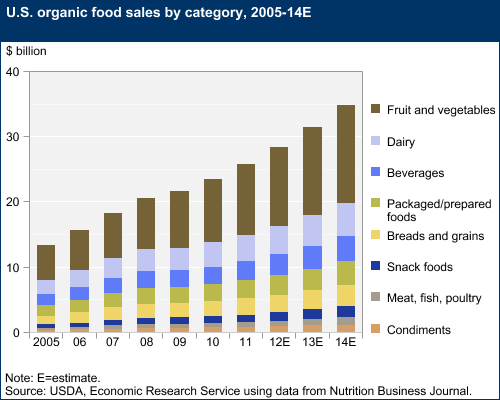
A yearlong audit by the US Department of Agriculture's inspector general's office found weaknesses in the oversight of imported organic produce, according to a report released this week — in other words, consumers who make a point of buying organic food may be getting ripped off.
One major issue the audit uncovered was that imported organics — which consumers believe to be free of chemicals — could actually be treated with regular pesticides at the port of entry.
"Imported agricultural products, whether organic or conventional, are sometimes fumigated at US ports of entry to prevent prohibited pests from entering the United States," the report said.
Since "there are no special treatment methods for organic products," the report noted, the same substances used to get rid of pests on conventionally grown food are used on the organic foods — and there are no controls to ensure these products are no longer sold or labeled as organic.
The director of the National Organic Program — the small arm of the USDA charged with ensuring that all products bearing the agency's organic seal actually meet its standards — announced his resignation on Sept. 10, days before the audit was released. Miles McEvoy, the USDA deputy administrator who had run the National Organic Program since 2009, has had a long career in organic agriculture, including a stint as the first organic inspector for the Washington State Department of Agriculture, according to his bio on the USDA's website.
The USDA Agricultural Marketing Service, which oversees the organic program, said in a statement to BuzzFeed News that it agrees with the inspector general's findings and recommendations and has projects underway to improve oversight.
Bogus 'organic' foods reach the US because of lax enforcement. USDA can't verify imports are #organic… https://t.co/z8REQ3mWZi
The report's findings were met with scorn and outrage by food policy analysts and others who follow the organic industry, which has suffered prior embarrassments over its enforcement standards.
"Allowing [organic] imports to be fumigated is ridiculous," said Bill Freese, science policy analyst at the Center for Food Safety, an environmental nonprofit.
Other problems outlined in the report: There are inadequate controls at US ports to check documentation that products labeled as organic actually come from foreign farms and businesses that meet organic certification standards. Also, while the USDA has a process to resolve differences in organic standards between other countries and the US, the audit said this process was not transparent.
"This is just outrageous," said Freese.

The findings come as demand for organic food in the US reaches new highs — retail sales hit $47 billion last year — and imports of food marketed as organic rise. Last year, US imports of organics reached $1.65 billion, according to the USDA. Yet there have been multiple reports of fraudulent organic imports over the years, including a 36 million pounds shipment of soybeans from Ukraine in 2016, reported by the Washington Post. Previously, the USDA had caught companies in China and South Africa using fake organic certificates.
It's a problem for consumers, many of whom choose organic products for health reasons and a belief that they foster environmental sustainability. In return, such consumers typically pay a 20% premium compared with conventional options.
Domestic organic farmers also say these fakes put them at a disadvantage as they battle conventionally grown products at home.
"The root of the problem is the failure of the USDA and the federal government to help farms in the US to produce all the foods" that are needed to meet the growing demand for organics, said Ronnie Cummins, a farmer and the director of the Organic Consumers Association, a nonprofit.
The Cornucopia Institute, a nonprofit that has been fighting import fraud of organics for a decade, said that findings like the ones in the recent USDA audit are a threat to "organic integrity and the authenticity of organic food."
At the same time, the institute said, "domestic family-scale organic farmers are suffocating as they try to compete in a market that is rigged against them for lack of enforcement." The group criticized the Organic Trade Association, the industry's lobbying group, for "looking the other way" to the protect "big businesses in organic."
The OTA said this year it would set up a task force to address the fraud issue, and said in a statement to BuzzFeed News that "additional trade oversight and monitoring are needed to protect organic integrity here and around the world." The group said it was "pursuing legislative changes in the next farm bill to give the National Organic Program the tools it needs to prevent fraud by modernizing import certificates to move to an electronic tracking system and limiting operations that are currently excluded from certification."
